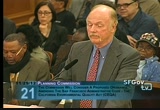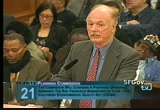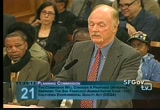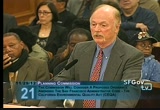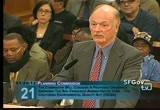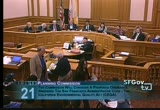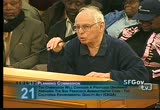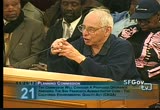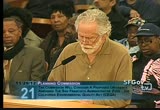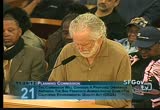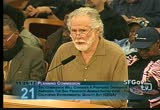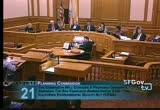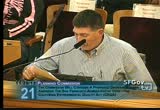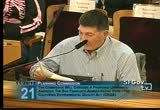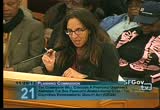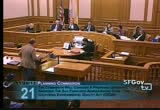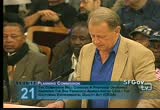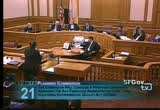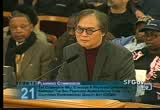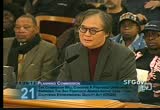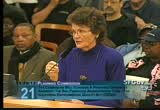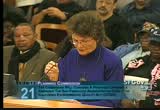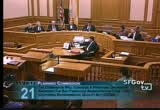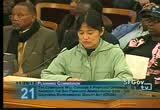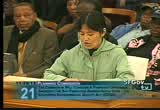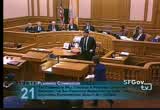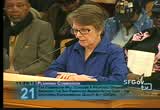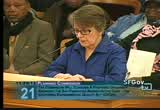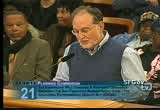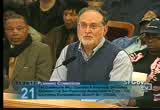tv [untitled] December 4, 2012 4:30am-5:00am PST
4:30 am
triggering action is an action on the discretionary permit. . e-i-rs are not going to change. this is filling a big gap in state law in terms of administering an appeals process and in terms of noticing. there is quite a bit of commentary which, i'll restrain from going too much into in term of where it's coming from, that suggests that somehow this proposal is being consistent with state law. it is restating state law in a couple instances. but since this is essentially gap-filling legislation, it is not going beyond or inconsistent with state law. * i think the issue that you are most likely to get confused about, whether by confusion of the speakers or by deliberate representation -- misrepresentations by the speakers, is this issue of substantial evidence. and without going into a long legal treatise, there's two
4:31 am
ways in which the term substantial evidence is used in c-e-q-a. one is an evidencery standard. one is an appellate standard. * the way in which this is introduced in this legislation has to do with evidence and very simply, if you want to make a case for conclusion, whether you is the city or you is the appellant, you need to substantial evident to support it. that's all that this ordinance says. that's what the state statutes say, that's what the state guidelines say, that's what the statute says. it doesn't produce any permissible standard. the other way in which substantial evidence is used in c-e-q-a is as a standard of review. and in very simple terms, there's two basic standards. there's substantial evidence which is defresidential to a lead agency, it primarily applies to e-i-rs and addenda and infill exemptions.
4:32 am
and there's fair argument which primarily applies to negative declarations. this does not addressing that. in fact, more broadly, this ordinance does not address the substance of how c-e-q-a is -- review is done or how c-e-q-a challenges are evaluated. this does not get into the nuts and bolts of how review is done. naturally improper under state law. it would be improper under state law for any local ordinance to state a standard of appellate review. naturally the place of the legislature or the courts if we were to put such standards in the ordinance, would -- basically we'd have to -- we'd be subject to having to change our local ordinance based on whatever happens in other jurisdictions. final point which i think has been made, and i won't go too long on this. most of this is about exemptions. if you look at the materials
4:33 am
that have been compiled at commissioner sugaya's request, there is a compilation of appeals that have gone to the board. it's not fully complete because we got the request a couple days ago. either a period where there were some major e-i-rs that went to the board on appeal or went to the board in general for major land use plans, fully 60% of the appeals are for exemptions. and exemptions, if you look at the tallies, you know, there's many long periods of gaps when the environmental document was prepared and when the appeal heard two years, year and a half, year, whatever. and that in most cases is a reflection of people waiting, they have exhausted all other avenues, waiting until there is a last permit, maximizing the delay, maximizing the cost,
4:34 am
maximizing the uncertainty. that is what this legislation tries to deal with. i'm sure there will be other questions. thank you. >> thank you. is there any additional staff presentation? okay. we're going to go ahead and open up to public comment now. and i'll call some names. since we have so many speakers, maybe we can all line up on your right side of the room. and if you can wait till i call your name, that would be great. michael russum, jonathan goldberg. i'm really sorry, can't read this one. c-h-o-d-e-n. susan vaughan. george wooding. and tony getener. if your name has been called -- there you go, thanks.
4:35 am
i'm going to again submit this, if you would. my name is bernard showed en. i'm with san francisco tomorrow. the issues that i raised are obligatory. [speaker not understood]. it is an obligation for your consideration. the problem is that c-e-q-a does not exist in an enforceable manner in the city of san francisco. it does not meet the mandates of professional and state mandates. there is no means of enforcing findings of the vacation needs as required by c-e-q-a. it is not simply and with good
4:36 am
intention that we address c-e-q-a, but we address it in the extent it needs mitigation. we do not have the institution, resources, or planning expertise in evidence that regard affordability or habitability for the city's costs and the people who live here. it's not about beautification cumulatively. it is community, social equity. it's not just the cost to the developer, but the cost to the public that is entertained. if there were adequate research in mitigation and a condition of assessment of needs by a professional staff the public would not need to expensively respond. i bring in question park merced which i represent [speaker not
4:37 am
understood], where 8900 people are at risk because of a lack of proper c-e-q-a analysis, a lack of assessment of affordability. and because supervisor wiener was called to account by the supervisors sunshine ordinance task force for a lack of allowing public comment after, in effect, supervisorial amendments were processed. he is repeatedly aware of abridging law and he's doing it again. thank you. >> next speaker, please. my name is michael russem, i'm a member of the park merced action coalition and a resident in the garden apartments there.
4:38 am
i am totally opposed to supervisor wiener's attempt to curtail the rights of citizens such as myself and my family to be adequately notified of threats to our well-being, to be heard about our objections [speaker not understood], and to be franchised in a democratic process. c-e-q-a has assisted that would allow us to have some say about developments that would harm us. the demolition of my home in park merced, the loss of our open space, trees, and safe play areas for our children the homes of 5,000 working citizens; my neighbors is in need of protection. supervisor wiener was already found guilty of misconduct by the sunshine ordinance task force railroading demolition of state law. he was referred to the ethics committee and to the district attorney. supervisor wiener, there you go again. you would create an unbelievable obstacle to our
4:39 am
democratic participation. we may never know about the next bad development coming our way with 20 to 30 days' notice. most of the citizens in park merced don't follow these developments as carefully or quickly given their disabilities, their age, the demands on them. we may never know about the next development coming our way. there will belittle or no time to be involved in protecting ourselves. not the years of engagement we have had to help shape solutions that meet our needs. we were able to show that promises to keep rent control are unfounded and legal precedent. mitigation for our losses were provided, guaranteed or not, and we would have little ability to hire lawyers, to pay for them, and to pursue redress for our grievances under this horrible proposal. this proposal would really disenfranchise citizens like me from very, very serious effects on our lives.
4:40 am
it's a terrible proposal. it must be quashed. thank you. good afternoon, commissioners. my name is jonathan goldberg and i'm here with san francisco beautiful. we commend supervisor wiener's efforts to codify the administrative procedures recommended and found workable by the planning department. however, we are concerned with limiting the time frame with which projects can be reviewed and appealed. pleased with with the commission's [speaker not understood] to review proposed [speaker not understood]. thank you. >> thank you.
4:41 am
good afternoon, commissioners. my name is george [speaker not understood]. i want to start first with thanks for letting me speak. i think it is incumbent. scott wiener proves that the c-e-q-a policy is really being abused. i heard [speaker not understood] about the lafayette park in the testimony. i'm not even sure that had anything to do with c-e-q-a. i came in to talk today about the amendments to replace the fair argument standard with substantial evidence standard to determine when a project may have a significant attack on the environment. under the current ordinances, the [speaker not understood] must decide whether the project may have a significant effect on the environment based on a fair argument standard. [speaker not understood] code 31.1. the proposed amendment eliminates all references to the fair argument standard and
4:42 am
adopts a new substantial evidence legal standard for the city's c-e-q-a purposes. the fair argument standard is another standard than substantial evident. under california statute, the city must create an e-i-r when a project may have a significant effect upon the environment. the legal standard in question is an interpretation of may. accordingly, it is likely more projects would require an e-i-r under the fair standard -- fair argument standard and pier project would require an e-i-r under the substantial evidence standard. more over, california case law has consistently adopted the fair argument standard when interpreting whether the project may have a significant effect on the environment. thus it is unclear whether the city of san francisco has the
4:43 am
authority to change the legal standard used under state law. thank you. >> thank you. go ahead, next speaker. i'll call a couple more names to get ready. howard wong, judy berkowitz, arthur feinstein. rose brass. rose hill son. tess will born. good afternoon, commissioners. mienname is sue vaughan. i'm with the sierra club. i'm asking you to vote against legislation amending local application of c-e-q-a. quite simply the legislation was put together without widespread public notification or input. * from san francisco residents . there are some serious issues that are going to take time for people like myself. i'm not a lawyer, to get my head around. and we need to have that time. the sierra club was not notified about this. we stumbled upon it. we deal with this kind of thing all the time. we were not invited. we were not a stakeholder.
4:44 am
i am with the sierra club. one public notification about projects which the legislation proposes to significantly restrict regarding negative declarations. that's been restricted in this legislation. two, the window of opportunity in which san francisco residents can watch appeals of problem projects the america's cup which legislation proposes to reduce to within 20 days of the first approval by any agency. three, and almost complete elimination of the opportunity for san francisco residents to appeal projects to the board of supervisors. and four, its potential illegality in changing from the fair standard to the substantial evidence. thank you so much. commissioners, good afternoon.
4:45 am
my name is tony getener. lame duck holiday legislation is presumptively suspect. more over, this proposed evidence is putting the cart before the horse. as a state legislature, we'll be taking up changes to c-e-q-a next year. it would be more logical to wait on those changes, including the filling of gaps in state law before proceeding here. while streamlining c-e-q-a may seem like an attractive concept, it is not so when in effect it is a trojan horse. as i understand it, for example, the public will be denied the right to a hearing before the full board of supervisors on the inadequacy of a new e-i-r if a project requires any approval action by the board. as earlier noted, the ordinance deletes the fair argument standard as the basis for determining whether an e-i-r is required and replaces it throughout with a substantial evidence standard. i believe this renders the proposed legislation fatally
4:46 am
flawed despite what the city attorney may opine as 30 years of legal [speaker not understood] requiring the fair argument standard. timelines for filing appeals to c-e-q-a determinations are confusing. there is no way for the public to know with any certainty when or if time limits are triggered. the proposed amendments believed [speaker not understood] given this commission discretion longer period for comments on an e-i-r of exceptional size or complexity. also, new requirements for filing an appeal with the board of supervisors are burdensome and unreasonable. there are other concerns as well. this legislation should be continued to 2013 after resolution of proposed c-e-q-a changes in sacramento. compassion for the environment is as compassion for our fellow human beings. thank you for your time. >> thank you.
4:47 am
howard wong. as acknowledged by supervisor wiener and the city planning staff, this is complex, difficult to understand even for architects as myself or planning commissionerses like yourselves. and yet the proposal initially was to have a hearing here on november 15th, a land use committee hearing on the 19th, and a board hearing on the 20th right before the thanksgiving holidays. * without any stakeholder participation, or, frankly, notification of a wide nature to the general population. this was similar to the attempt that c-e-q-a legislation in 2006 and 2010 in this city. it was also similar to the august 2012 attempt to introduce c-e-q-a legislation
4:48 am
in sacramento state legislature in the last two weeks of its legislative session. in sacramento, the state senator tabled the item and promised in 2013 there would be a collaborative effort to review c-e-q-a. on november 1st there was a spur and business association sponsored bus tour in san francisco with state senator michael rubio in an attempt to introduce different parts of our community to some of the issues of c-e-q-a by visiting projects which had some c-e-q-a problems. and with the acknowledgment that all the stakeholders would be brought to the table to review the issues and collaborate and come up with some mutually agreeable changes.
4:49 am
but in reality as an architect having worked on large major projects and programs like the candlestick park renovations or youth guidance center renovationses or airport projects or muni railway projects, and as you have seen on any project that comes before you, there is a very detailed critical path scheduled that's developed by project managers and architects to anticipate all the parks [speaker not understood] in the project. and they all have to be met and they usually are. and c-e-q-a is only a very small part of that. thank you. >> thank you. good afternoon, commissioners. my name is tess well born representing the haight/ashbury neighborhood. [speaker not understood].
4:50 am
this late draft legislation is not yet. this was crafted without significant input from environmentalists, neighbors, social justice, housing, tenant rights groups and historic preservation, and now a week after it was or so after it was introduced, we are being asked to come in and help tailor it. but what has to be done is toss this out and actually say, let's have everybody at the table at the beginning. it's very difficult to go through all of these pages and to manager this spot or that spot. this is a failing of public process here to have something presented with that kind of timeline, this kind of impact and with no involvement by the public * . c-e-q-a offers many benefits to city residents, government, and to developers by providing considerable notice to the public, encouraging developers and residents to work together
4:51 am
and to develop mutually beneficial plans, to reduce appeals and costly litigation which is beyond most residents and community organizations' means anyway, and the government doesn't need costly litigation either. also, the c-e-q-a process allows reducing appeals to the board of supervisors. but, in fact, there are only about 10 appeals to the board of supervisors in any given year of the thousands of projects. so, that's kind of a safe argument to say we have to protect the board of supervisors from appeals. so, please stop this legislation. please give all of us time to digest the memo that you just received today and we just received today, and let's go back to having some real involvement of stakeholders in crafting legislation a fresh rather than trying to amend this bad draft. thank you.
4:52 am
good afternoon, commissioners. my name is rose hill son. first of all, in this piece of legislation which is new 2012 legislation, it's not something that should be considered as an extension of the 2006 or 2010 legislation. therefore we've had millions of meetings on it, that's not the case. the first meeting i was at was the planning commission meeting on november 15th. so, this is my second one here with you. in the november 21st historic preservation commission meeting there was a big discussion about what the first approval. and therein lies the problem. if you don't know when the first discretionary approval is, no one can figure out when the notice is going to come out, from what department, what agency, and you have all kinds of agencies. airport, sfmta, dpw, dbi, rec and park. it could be anything like a plumbing permit. and no one would know when the first approval is. so, the whole thing is very vague. and then you get this thing about someone says, oh,
4:53 am
supervisor wiener says, this is improved noticing. well, in some of these instances in the legislation, if you read it very carefully as on page 2, lines 1, 12, i wasn't going to net pick in the weeds, but i have to noticing could be optional or none. * 11 because depending on the circumstances, some notices are not required and in some instances they are, so, you don't know if as it's optional or required. so this is going to turnout to be very vague. then you have this thing where you have these hearings. well, a hearing could be scheduled as on page 14 lines 7 through 8f, but it doesn't have to be held. it says it just has to be scheduled. so, the clerk can schedule a hearing, but then the next criteria is, well, how long after? well, there's no minimum so you don't even have a 14-day minimum to wait and then the next day it could be a scheduled hearing. and that's really hard for anyone to come up and try to appeal anything that way. and then when the legislation is cad ex, i think this legislation itself as a project could be -- should not be cad exed. there could be some unusual
4:54 am
situations that can arise in some projects and as it stands you don't know when the project is actually become right because it keeps changing. look at the treasure island situation. i don't know who appealed it when. suddenly i read in the paper there was some sort of radioactive thing found over there. well, you know, if this were in place, they'd say oh, well too bad, the radiation is there, we'll continue to build. and you can appeal it. it's all very vague and it should be avoided on vagueness and the whole thing -- the whole legislation probably needs an e-i-r and the last thing i wanted to say is there is a letter from coalition from san francisco neighborhoods and it says, therefore we urge you to strongly disapprove this proposed legislation in your recommendation to the board of supervisors. here are 12 copies. thank you very much. >> thank you. [laughter] (applause) >> excuse me, excuse me. please, no outbursts or disruptions. thank you.
4:55 am
commissioners, good afternoon. judy berkowitz, coalition for san francisco neighborhoods. the coalition urges you to strongly disapprove this proposal in your recommendation to the board of supervisors. along with we would -- we urge you to -- one of you to make a motion of improper notice because you were not provided with the appropriate documents in a timely manner. i'd like to warn you, there may or may not be hyperbole ensuing. [laughter] this proposal is basically environmental deregulation. as an example, i believe commissioner moore asked, and i would like to bring up again
4:56 am
several others of park merced. if park merced had undergone this -- if this legislation had been in place when park merced was first a twinkle in the eye, everybody weighed in on it with approval because it was all two stories and it fit in the good earn apartments that are there now. however, at the end its was power buildings and now is undergoing litigation. * fit in with the garden apartments there is one instance, a very clear example what would change had this been in place or had it not been in place. i also find this ironic that this legislation is purported by its author to be open and extended in its notice when, as others have noted, its notice was buried at the end of november. it wasn't even noted that it was going to be c-e-q-a or had
4:57 am
to do with any of the other kind of changes that are in it. so, we urge you again to strongly disapprove this proposal when you send your recommendation to the board of supervisors. thank you so much. >> let me call a couple more names. lynn gavin. matt reagan. joan wood. brent platter. tim colin. and shannon gallagher. commissioners, i'm arthur feinstein. i'm chair of the san francisco bay chapter of the sierra club and i'm following up with my friend sue vaughan carrying on her message to you, which is for you to disapprove this or reject this proposal as it now stands.
4:58 am
you had quite a few letters from lawyers expressing concerns over this and most of them, if not all, have told you basically that there are parts of this that simply violate state statute. you've had your own lawyer say no, and the supervisor said no, it's not the case. but concerning how many lawyers have found those kind of conflicts, we ask that you step back and start another process of deliberation to make sure that this does not itself end up in court, which is what you're trying to achieve to begin with, a simplified process that doesn't have that. i do want to bring up the issue of why we have c-e-q-a in the first place, to try and remind everybody what the context is, because this is being framed as c-e-q-a is just a burden we have to get throughv so we can do development. and, so, i would like to remind you of the love canal in new
4:59 am
york and so many other projects where people are injured because of what takes place because people did not have the information they needed to know what the impacts of that project may be. we have new impacts now with climate change and sea level rise. we're having the warriors with their a rectionverctiontion a are they taking into account sea level rise sufficiently? will the c-e-q-a allow us to analyze that if we start going through an appeal process, a revision to an appeal process that removes the public's ability to comment on these issues and appeal them, we may end up with many disasters that will be much more costly than the proposed money that these projects will bring in. so, this is no small thing. the other part about c-e-q-a is it is a citizen enforcement me anixthvment. -- mechanism. nobody can enforce c-e-q-a, but citizens can.
121 Views
IN COLLECTIONS
SFGTV: San Francisco Government Television Television Archive
Television Archive  Television Archive News Search Service
Television Archive News Search Service 
Uploaded by TV Archive on

 Live Music Archive
Live Music Archive Librivox Free Audio
Librivox Free Audio Metropolitan Museum
Metropolitan Museum Cleveland Museum of Art
Cleveland Museum of Art Internet Arcade
Internet Arcade Console Living Room
Console Living Room Books to Borrow
Books to Borrow Open Library
Open Library TV News
TV News Understanding 9/11
Understanding 9/11